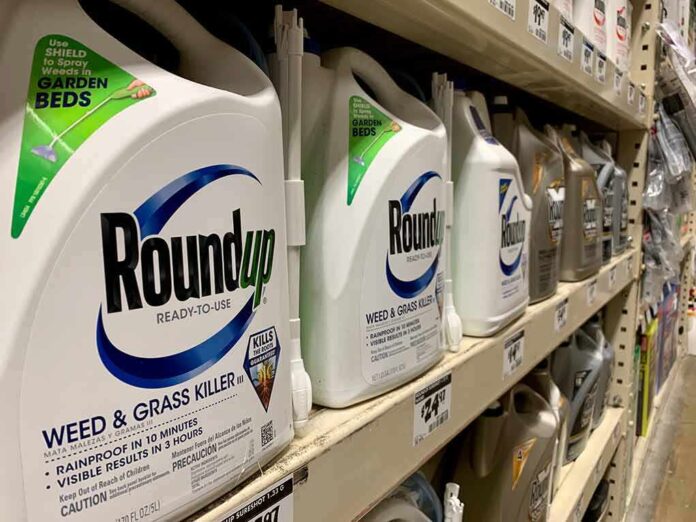A Georgia jury delivers a staggering $2.1 billion verdict against Bayer in the latest Roundup cancer case, continuing the mounting legal challenges that have followed the company since acquiring Monsanto and its controversial herbicide.
Quick Takes
- Georgia jury awarded John Barnes $2.1 billion, including $65 million in compensatory damages and $2 billion in punitive damages for claims that Roundup caused his non-Hodgkin’s lymphoma.
- Bayer plans to appeal the verdict, claiming it conflicts with scientific evidence and regulatory assessments of glyphosate safety.
- The International Agency for Research on Cancer classifies glyphosate as a “probable human carcinogen,” while the EPA maintains it’s unlikely to cause cancer when used as directed.
- Bayer has already paid approximately $10 billion to settle similar claims and has set aside an additional $5.9 billion for over 60,000 pending cases.
- This verdict is another major legal setback for Bayer following its $63 billion acquisition of Monsanto in 2018.
Massive Verdict Adds to Bayer’s Legal Troubles
The $2.1 billion award ordered by a Georgia jury marks one of the largest legal settlements in the ongoing litigation surrounding Roundup weedkiller. John Barnes’ lawsuit, which began in 2021, claimed that his non-Hodgkin’s lymphoma was caused by exposure to the glyphosate-based herbicide. The jury agreed, awarding $65 million in compensatory damages and an additional $2 billion in punitive damages, signaling their belief that Bayer’s conduct warranted substantial punishment. This verdict adds to the mounting legal troubles Bayer has faced since acquiring Monsanto and its flagship product in 2018.
Kyle Findley, Barnes’ attorney, called the ruling an “important milestone” in their legal battle. Bayer, however, maintains that the verdict contradicts scientific consensus and regulatory assessments. The company plans to appeal, noting that in previous cases, final judgments have typically been reduced by about 90% compared to original jury awards. Nevertheless, this case represents yet another substantial financial blow to the company, which has already paid approximately $10 billion to settle similar claims.
Scientific Debate Continues Over Glyphosate Safety
At the heart of the Roundup litigation is an ongoing scientific debate about glyphosate’s safety. In 2015, the International Agency for Research on Cancer classified glyphosate as “probably carcinogenic to humans,” a designation that contradicted previous safety assessments. This classification sparked thousands of lawsuits against Monsanto and later Bayer after its acquisition of the agrochemical giant. The conflicting scientific viewpoints have created a complex legal landscape where juries are asked to evaluate competing expert testimonies.
The U.S. Environmental Protection Agency, however, maintains that glyphosate is unlikely to be a human carcinogen when used according to label directions. This contradiction between regulatory agencies has complicated the legal proceedings, with plaintiffs pointing to the IARC classification while Bayer cites the EPA’s assessment and other regulatory bodies worldwide that have deemed glyphosate safe when properly used. The Ninth Circuit Court of Appeals has also questioned the EPA’s conclusion, noting studies indicating “human exposure to glyphosate is associated with an at least somewhat increased risk of developing NHL.”
Financial and Legal Implications for Bayer
Bayer’s 2018 acquisition of Monsanto for $63 billion has proven to be a costly decision beyond the purchase price. The company now faces over 60,000 pending Roundup lawsuits, with more than 165,000 filed in total. To address this liability, Bayer has set aside an additional $5.9 billion, though the Georgia verdict suggests this amount may be insufficient. The company’s stock value has plummeted since the acquisition, with investors concerned about the seemingly endless litigation and substantial settlements.
Lawyers for Bayer said, “We believe that we have strong arguments on appeal to get this verdict overturned and the excessive and unconstitutional damage awards eliminated or reduced.”
In the face of continued legal defeats, Bayer is pursuing multiple strategies, including lobbying for legislative protection against future Roundup lawsuits and appealing unfavorable verdicts. The company achieved some success in having original jury awards reduced significantly on appeal, yet the persistent litigation continues to strain its finances. This latest verdict follows another recent setback in Philadelphia, where Bayer was ordered to pay $75 million in punitive damages in October 2024, showing that the company’s legal challenges are far from over.
Sources:
- https://www.wisnerbaum.com/toxic-tort-law/monsanto-roundup-lawsuit/
- https://www.reuters.com/business/healthcare-pharmaceuticals/bayer-hit-with-2-bln-roundup-verdict-us-state-georgia-cancer-case-2025-03-22/
- https://m.economictimes.com/news/international/business/us-state-orders-bayer-to-pay-2-billion-in-roundup-cancer-case/articleshow/119350109.cms
- https://www.theepochtimes.com/business/bayer-ordered-to-pay-2-billion-by-georgia-jury-in-roundup-cancer-case-5830294











